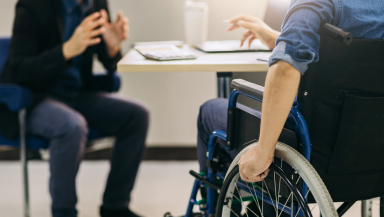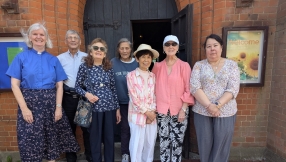
In June 2017, Colin Campbell was due to die at Swiss euthanasia clinic Dignitas.
He had been struggling with Multiple Sclerosis (MS) since 1995, but his outlook on life changed when after living alone in a second floor flat and losing mobility, he began to feel like a prisoner in his own home. As he slowly lost contact with friends and suffered from other poor health outcomes, Colin decided to end his life.
Everything changed for Colin when he met Rona. Rona also has MS and could see that Colin simply wasn’t getting the help and support he needed to live a full and independent life. She went out of her way to help him secure the social support that he needed – better living conditions and even a mobility scooter to help him get out and about.
With these improvements to his life, not to mention the social connections he now enjoyed, Colin chose not to go through with his scheduled death at Dignitas. Reflecting on his change of mind, Rona commented: “He didn’t need to die; he needed support."
Colin’s story is a reminder of the difficulties that disabled people face every day, how these difficulties can lead to feelings of despair and anguish, and how such feelings can be alleviated when authorities uphold their duty to provide proper services, equipment, and social interaction to help disabled people flourish.
The government’s decision to make cuts to Personal Independence Payments (PIP) and Universal Credit (UC) was alarming for disabled people and the groups that advocate for them. Particularly after the vote just twelve days earlier to progress the assisted suicide Bill – a policy that disabled people’s organisations across the UK staunchly oppose. These votes create an anxiety-laden atmosphere for those who are more dependent on the state for support.
Whilst there are arguments for reform to the welfare system, disabled people’s organisations warn of a perfect storm of a depleted welfare system and state-assisted suicide. Many disabled people need to fight tooth and nail for the support that enables them to live. In the context of an assisted suicide law, hopeless and worn-down citizens who lack the support and solidarity they deserve may resign themselves to death. This thought should alarm everyone who hopes for a more just society.
One of the specific functions of the PIP system is to provide funding to pay for the heightened costs of life as a disabled person – extra equipment, higher energy bills, etc. Restricting access to this funding means that disabled people across the country will lose the ability to pay for the essential resources that make their lives more livable.
The assisted suicide Bill as it stands contains no requirement for physical suffering to be present to make a person eligible for an assisted death. What’s more, the Commons voted down an amendment that would have ensured that people struggling with mental ill health, disabled people, and people who feel like a burden do not qualify for assisted death. As such, disabled people will be able to apply and get approved for assisted suicide even if their sole motivation is that they’re lonely, unsupported, or feeling like a strain on others – a feeling that losing access to PIP payments could directly inspire.
The Pathfinders Neuromuscular Alliance shared stories of its members’ experiences with health and social care services. One person reported that their doctor had asked them ‘have you got any idea how much you cost the NHS?’. As unpleasant as it is to think about it, there are people who’d apply pressure to a disabled person who’s eligible for assisted death.
It is beyond doubt that the disabled people’s community is at risk from cuts to disability benefits coupled with the legalisation of assisted suicide. The experience of disabled Canadians such as Christine Gauthier illustrates the danger of legislating for assisted death in a context of social inequality.
In 2022, the Canadian Paralympian and veteran was offered Medical Assistance in Dying as an alternative to waiting for a wheelchair lift to be installed in her house. She reported being told, “if you’re so desperate, madam, we can offer you MAID”. Societal stigma towards disabled people – the idea that they are a burden on the state, for example – does not disappear when euthanasia is legalized. Injustices are only compounded.
Given the lack of access to disability equipment we can now expect for new claimants, it is not difficult to imagine cases like Christine Gauthier’s in the UK in years to come. This is one reason why decisions made in recent weeks are a travesty. There is still time for parliamentarians to think again. We’re praying that they will defend the cause of the most needy (Psalm 82:3) and vote to protect life.
Jack Lawther is a policy officer at the social policy charity CARE.













